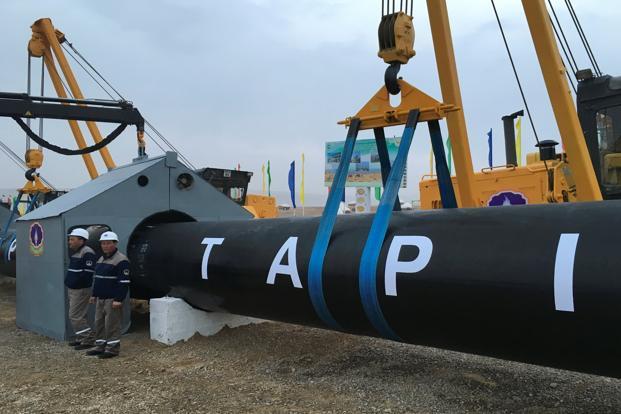India has sought to renegotiate the gas prices of Turkmenistan–Afghanistan–Pakistan–India Pipeline (TAPI) due to continuous slump in energy prices in the global market. The four countries involved in the project signed a Gas Sale Purchase Agreement (GSPA) in 2013 to purchase natural gas at 55 percent of the prevailing crude oil price. From that deal, the natural gas prices would be about $7.5 per million British thermal units (mmBtu) at current oil prices at the Turkmen border. Adding to that, India would pay the transit fee and transportation charges which would take the prices to over $10.5 per mmBtu at the Indian border. The consumer must pay the taxes and local transportation charges ultimately taking the final prices around $13 per mmBtu.
“This rate in the present global energy scenario is unacceptable. And so taking into cognizance of the current gas market, India has proposed for re-negotiation of GSPA,” said a source. The oil companies pay $3.6 per mmBtu to domestic producers in the country while for Turkmen gas, they would have to pay 7.5 per mmBtu- a more than double. The leaders of the four countries performed groundbreaking ceremony of TAPI pipeline in December 2015 but the project is yet to take off with good pace, the progress is very slow. Citing the southward movement of global commodity prices, the economic viability of the project is under doubt and this is the main reason behind slow progress in the project.
TAPI pipeline will service four countries. It is nearly 1,680-kilometers long of which 735-km is in Afghanistan and nearly 800-km in Pakistan. The 56-inch diameter pipeline will run from Turkmenistan’s Galkynysh gas field to Herat and Kandahar in Afghanistan, before entering Pakistan. In Pakistan, it will reach Multan via Quetta before ending at Fazilka (Punjab) in India. Turkmenistan would export 90 million standard cubic meters per day of gas through TAPI, with Afghanistan getting 14 mmscmd and India and Pakistan 38 mmscmd each. The gas will be sourced from the Galkynysh Gas Field, which has a capacity of more than 21 trillion cubic meters. “It is clear now that Southern Yoloten-Osman gas field (Galkynysh Gas Field) can be regarded as second largest in the world,” said Turkmen geologist. So, if India gets a regular transportation of natural gas from the second biggest natural gas in the world, its import requirements could be met at one stop. The export is limited to 38 mmscmd for both India and Pakistan as of now but Pakistan’s energy import requirement is not even a quarter of India. So, for all practical reason, the import of India will increase in future and price renegotiation becomes necessary.
India, being the fastest-growing major economy is energy-hungry with imports growing exponentially. The country could negotiate for a better deal given its large imports. TAPI pipeline is not the first energy purchase, for which India is renegotiating the price. In past Australian, Qatari and Russian companies have lowered the energy import prices for India. The country renegotiated 2.5 million tonnes a year of liquefied natural gas (LNG) import from Russian company Gazprom which saved between Rs 8,500 crore and Rs 9,500 crore over the contract period 20 years ending 2040. US energy major Exxon Mobil Corp lowered the price of 1.5 million tonnes a year of LNG from Gorgon project in Australia which saved approximately Rs 4,000 crore of India foreign exchange. Renegotiating the prices from foreign countries indicates that the country is moving towards ‘realpolitik’ foreign policy of great Indian thinker, Chanakya.
